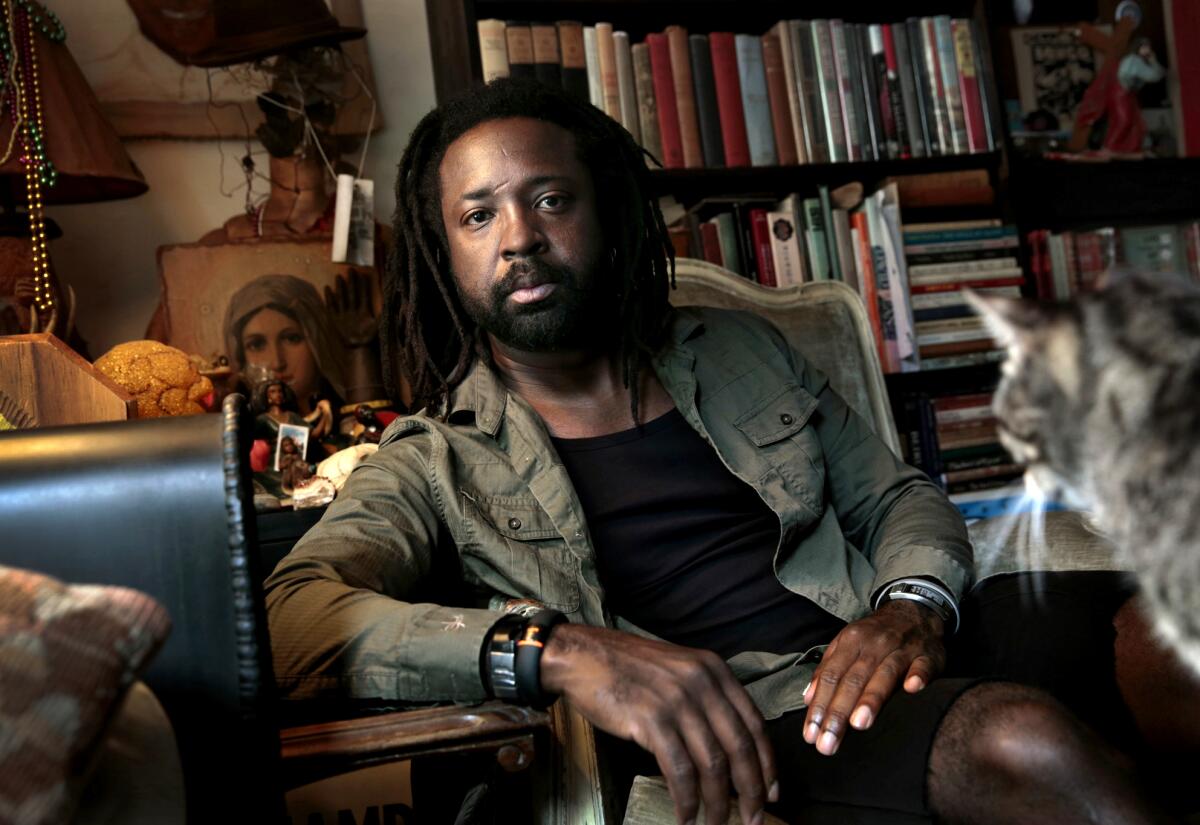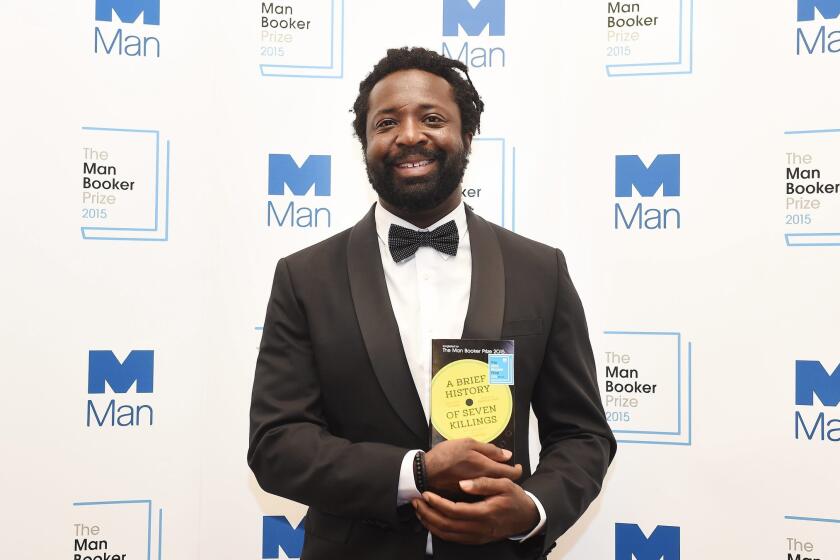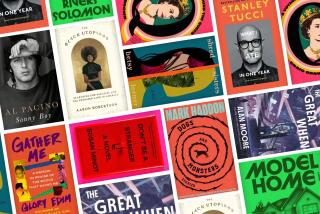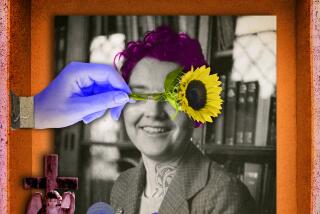For novelist-podcaster Marlon James, itâs Dead Writer Summer

Jake Morrissey can talk for a long time, I tell novelist Marlon James, referring to his longtime editor at Riverhead Books.
âWell, I give him really, really long books to edit, so it might be my fault!â James says, laughing down the telephone line from his home in Brooklyn.
James is connecting to introduce Season 2 of âMarlon & Jake Read Dead People,â the deeply literary, deeply fun podcast about books by writers of the past. In this second season, theyâll turn to books new to at least one of them, along with some quirkier choices â while sticking to their theme of speaking candidly of the dead. Hereâs a trailer to the new season.
Their debates â about Trollope versus Dickens, or the pros and cons of âMoby-Dickâ â can be pretty contentious, and I wonder if the podcast imitates life.
âIn the sense that our conversations have almost nothing to do with the books right in front of us, yesâ says James, who is currently working on the second book in his Dark Star trilogy. âBlack Leopard, Red Wolf,â the first in the series, was a finalist for a 2019 National Book Award and won The Timesâ inaugural Ray Bradbury Prize. His previous novel, âA Brief History of Seven Killings,â won the Booker Prize in 2015.
Born and raised in Jamaica, James received what he calls a âvery poshâ education at boysâ schools, whose curricula remained colonial even after the country gained independence from Britain in 1962. âThere was this insistence that you have to learn bedrock stuff, Chaucer and Spenser and Christopher Marlowe.â
He absorbed more than he knew at the time; after all, âeven Shakespeare got some good barbs in about absolute power.â And postcolonial literature was heavily influenced by its oppressors. âI mean, Marquez has magical realism because he was never too far from Cervantes.â
Marlon James, whose novel âBlack Leopard, Red Wolfâ pioneered queer fantasy, thanks Mary Shelley and âMoby Dickâ for predicting our current crisis.
What makes their show work is this interplay of cultures and educations: James knows about books Morrissey may not, and vice versa. Season 1 cut a vast swath across genres and topics â myths, memoirs, epics, movie adaptations, âtrashy novels.â
âWe have a pretty wide library of books to draw on between us, which is another way to say we both read too much,â says James. âOur conversations are always very discursive. Jake would drop an allusion, and I would say, âThat writerâs a jackass!ââ
These lively exchanges gestated for years. After a while, colleagues started hovering in the hallway whenever James would stop by Riverhead headquarters for a chat. Before long, a colleague came up with the idea of producing an in-house podcast.
âWhat drew people to these arguments is the idea that literature is worth fighting for â but itâs also worth fighting over,â says James. âIf you have an argument about âHamlet,â thatâs another way of saying âHamletâ is important.â
Morrissey agrees. âWe are talking about books the way other people talk about sports,â says the editor. âOr about âGame of Thronesâ or âFriendsâ episodes or what have you. Weâre talking about works of literature as fans, [which] means weâre not reverential. We donât kneel at the altar of any author, and since our primary relationship is as author and editor, weâre both very interested in the mechanics of books. How do authors get the reactions readers have to them?â
Each man has pointed the other to books they havenât read before, and listeners will hear a lot more about that this season. âIn Season 1 we mainly discussed books we both knew well,â says Morissey, âbut this time around, thereâs more of, âDude, have you read this?ââ
Enthusiasm aside, theyâre not above a bit of leg-pulling. âIâm a huge fan of Anthony Trollope, and Marlon hates the Barchester Chronicles. So for one Christmas I gave him a complete set of the Palliser novels, carefully wrapped, with a card that said, âThere will be a test,ââ Morrissey says. âOn the other hand, Iâm a big fan of Dickens, but heâs a bigger fan. He even loves âGreat Expectations.ââ You can practically hear Morrisseyâs eyes rolling.
Veteran biographer A.N. Wilson takes on one of the most popular, prolific and puzzling writers in English literature in âThe Mystery of Charles Dickens.â
But James has a good reason for loving âGreat Expectations.â He believes books are meant to take us on adventures â physical or internal. âI want to see a character develop and change, and that can happen in an afternoon set in a drawing room or across continents, you know?â
He goes back to his student days: âIâd been reading so much stuffy British exile lit, and I finally went to the exams office and asked if there were other books on the syllabus. Thatâs where I came across âTom Jonesâ! Man, did I have the time of my life reading that novel.â Ever since, he has read with little regard for high-low conventions. âItâs this sort of ridiculous thing that we have in literature, where he whoâs prettiest â by which I mean most acceptable â makes the rules.â
He pauses. âHarold Bloom would have issues with this, but I think we need to broaden the idea of what is considered classical lit. Not just Toni Morrison, but also Zora Neale Hurston, and Nella Larsen, just to give one example.â
Just donât get him started (as Morrissey did) on âA Streetcar Named Desire.â âA lot of people must find us exhausting when we have that kind of argument,â says James. âI was yelling, âStanleyâs not no damn rebel! Stanleyâs a deluded, dangerous rapist! His take on reality is as shaky as Blancheâs!ââ
James says the fact that he and Morrissey can build a podcast around âdead peopleâ is a testament to the idea that the books themselves are anything but. âTalking about literature is a way to remind people that literature is something you can participate in. Donât keep people out! Nobodyâs coming for âyourâ books! ... Arguing about a book does way more for its legacy than if you try to save its preciousness intact.â
In Season 2, James and Morrissey will talk about everything from the last books published by major figures (e.g., Sylvia Plathâs âThe Bell Jarâ) to favorite short books and mutual new-reading assignments. For that last exercise, James assigned Morrissey an early 20th century novel about the Great Migration. Morrissey reciprocated with âthe worldâs shortest memoir, at 88 pages.â Let the debates begin â and may the odds be forever in Charles Dickensâ favor.
Marlon James, who won the 2015 Man Booker Prize for his novel âA Brief History of Seven Killingsâ on Tuesday night in London, is the first Jamaican novelist to receive the United Kingdomâs most prestigious literary award.
Patrick is a freelance critic who tweets @TheBookMaven.
More to Read
Sign up for our Book Club newsletter
Get the latest news, events and more from the Los Angeles Times Book Club, and help us get L.A. reading and talking.
You may occasionally receive promotional content from the Los Angeles Times.









